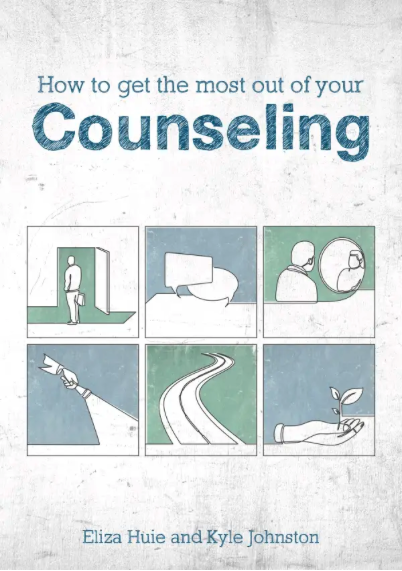Life happens to all of us. And when it does, we need all the help that we can get. The Lord has given us the Bible and people among many other good things to help us deal with the complexities and hardships of life. And he also gives us counselling.
In the African context counselling has quite negative connotations.
But counselling is not something most people easily consider. We often need encouragement when it comes to counselling. In the African context, as far as I know, counselling has quite negative connotations. I have often found a kind of reluctance towards seeking formal counselling. I also find this to be the case even in Christian circles. There is a kind of shame around seeking formal help. Seeking help is humbling. But we shouldn’t be ashamed, especially as those who’re already dependent on the Lord.
Thus I was grateful to be handed a review copy of How to Get the Most Out of Your Counselling. I found the title both intriguing and encouraging. Without a doubt, counselling helps. Sadly not only are many African Christians suspicious of it, but very few people tell others how counselling helped them. All of that makes this book an invaluable little addition, as it makes a case for counselling while also helping readers know what to consider before, during and afterwards. For the counselling process to prove most beneficial in the long run, this book argues, we must become proactive participants at every point of it. It exhorts readers to accept agency, be committed, and to prayerfully engage the process in order to grow and gain wisdom, finding peace and healing.
What Comes Before Counselling?
Do I Need It? When Should I Seek It?
To get the most out of counselling, the authors encourage self-awareness by checking in on how life is going. This means evaluating how you are doing, asking if perhaps you need to meet with a counsellor. In other words, we should try and identify issues or problems and then ask ourselves if we know the way forward. Those who get the most out of their counselling are those who accept agency regarding their own lives. We come to meet with a counsellor not because we are forced to, or even to get answers, but because we have ourselves taken the time to do some leg work. This will matter later too. Because counselling involves unlearning.
True, people usually turn to counselling in really tough times. But it’s valuable for various seasons of life, when you need wisdom, a different perspective, or a listening ear and companion. Added to that, counselling is even a good option when things are seemingly going alright. For we’re always working through things and experiencing countless challenges, whether we’re aware or not. Counselling is good. It is a means by which the Lord provides support, offers hope, and gives us voice to address issues.

How to Get the Most Out of Your Counseling
Eliza Huie and Kyle Johnston
How to Get the Most Out of Your Counseling
Eliza Huie and Kyle Johnston
We are not meant to face life on our own. Even with the best God-given resources, there are times when we find ourselves wrestling with the question of whether or not we should seek formal counseling.
By exploring a biblical approach to care, experienced counselors Eliza Huie and Kyle Johnston capture a vision for counseling that gets to the heart of real change. If you have questions, or are wondering where to start, this booklet will help you to determine not only if counseling would be a helpful option, but also how to get the most out of the process every step of the way.
Counselling is even a good option when things are seemingly going alright.
When it comes to finding a counsellor, wisdom and commitment to prayer are needed in the search. This book recommends biblical counsellors without suggesting you should avoid secular counsellors. Unlike secular counsellors, a biblical counsellor has a broader picture of why things are the way they are. They understand the world for what it is, humanity’s deepest problem, and God’s solution in Jesus Christ. A biblical perspective can therefore provide a holistic approach. The biblical counsellor, amid the struggles at hand, will encourage a continued walk with the Lord; offer bouts of wisdom or practical Christian insight; and point to our eternal hope.
It is wise to ask for referrals and to do some research, checking in with your community for a Christian counsellor who comes highly recommended. Other believers’ experience will be invaluable as you try to find a counsellor.
During Counselling and In-between Sessions
How Do I Get the Most From My Counselling?
Getting the most out of your counselling is largely dependent on you. There is a lot involved during counselling. The important thing that is required from you is commitment. You need to put in the effort. Huie and Johnston encourage commitment during your time in counselling in the following ways: honesty, slowing down, prayer, and follow through.
Getting the most out of your counselling is largely dependent on you.
“Candour is risky,” they write “but it is necessary in counselling.” You may want to save face, however this isn’t the place for it. It will get in the way of your growth and only bring more misery to your life. So you need to be honest with your counsellor, making yourself accountable and enabling the counsellor to administer the suitable truths to your situation.
Very often we would like to get over our struggles immediately. However, counselling demands that we slow down and take it easy. “The purpose in a man’s heart is like deep water, but a man of understanding will draw it out” (Proverbs 20:5). People are complex and life’s situations and struggles call us to take things slow as we seek to grow deeper in understanding both God and ourselves. So why the rush? Counselling affords you time to give attention to what’s really going on. Change is a process. By pacing ourselves we’re more likely to affect deeper change and sustainable growth.
By pacing ourselves we’re more likely to affect deeper change and sustainable growth.
Furthermore, prayer is essential. It would be unwise to not ask the one who knows all things; who is sovereign over all things. That’s like being lost and refusing to ask for directions! We need to ask the Lord to help us and to be at work, uncovering our deep insecurities, fears, beliefs, and passions.
Lastly, we need to follow through with the tools and application that we’re given. Do your homework. By doing so you can consolidate a session and prepare for the next.
What Comes After Counselling?
You need to continue to put into practice what you have learnt during counselling. Remember the truths you learnt too. We live in a world of suffering, struggles and hardship. Life will not get easier. But the truths, wisdom, growth and maturity that have happened through counselling will ensure that we’re better able to face life’s hardships with endurance, especially when our hope is found in Jesus.
For counselling to prove successful, it’s imperative that you’re in community.
The goal of counselling is so that you understand your life situation better. It also serves to equip you to navigate life, maturing in the knowledge of Christ and God’s wisdom. The aim isn’t perfection but progress. For counselling to prove successful, it’s imperative that you’re in community that will spur you on, encouraging joyful perseverance.
Again, without suggesting it’s the only form of counselling, the authors write: “Ultimately biblical counselling provides a richer approach to the human struggle. It offers biblical wisdom and a deeper understanding of how people change” (p16). The wisdom and promises of God are transformative, so much so that even if your circumstances don’t change you have a truth that anchors you. It is the person who changes, irrespective of their external situation. Also, the individual’s suffering and current situation is not their identity, it is where God has placed them in that particular season. Their identity is tied to someone bigger than them and external to them: Jesus Christ.
Make the Most of the Available Help
I found this book really easy to read. And it is only 40 pages long! Short enough for one sitting. However, if you are really considering counselling and would love to take steps in that direction, you should take more time to thoughtfully engage with the content in the book. This is an important decision. We need all the help we can get, both to make wise decision and to get the most out of your counselling. Counselling is valuable and it is worth it. This book makes a great case for that.












